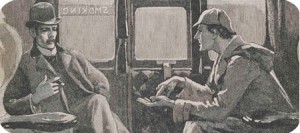This article was contributed by Mike Berlin, a specialist in the social history of early modern London in Birkbeck’s Department of History, Classics and Archaeology. Birkbeck is holding a study day on Saturday 14 March to coincide with the Museum of London‘s landmark exhibition on Sherlock Holmes. The afternoon will feature contributions from Alex Werner, Sherlock Holmes exhibition curator, Dr Nathalie Morris, Senior Curator of Special Collections at the BFI National Archive, and Emeritus Professor John Stokes of King’s College London.

“The air of London is the sweeter for my presence.” Sherlock Holmes in The Final Problem. ©Museum of London
Though the pipe and deerstalker have been replaced by a waxed Belstaff jacket, new generation of Londoners continues to be captivated of Conan Doyle’s original creation. What was it about the figure of Holmes that holds such fascination in the minds of generations of readers, film goers and now television viewers?
For many people the Holmes stories, originally published in the Strand Magazine with illustrations by Sidney Paget, are synonymous with Victorian London. The atmosphere of back alleys, dense pea soup fogs, hackney cabs and Bradshaw’s railway guides are the epitome of our image of the teeming city, a city of concealment, social mixing and crime.
The original fascination of Conan Doyle’s audience went with a deep-seeded fear of crime. The world’s largest city in 1900, an imperial capital that brought people and goods together from all corners of the globe, London was the perfect setting for a series of tales that mixed bourgeois morality with fear of the mysterious and foreign. Sir Arthur Conan Doyle used the imperial exoticism of the world’s greatest port, including the swamp adder and baboon of The Adventure of the Speckled Band.
It is no accident that Holmes’ opponents are mostly aliens. For late Victorian Londoners the ‘alien menace’ , associated in the popular imagination with the infamous Whitechapel murders of Jack the Ripper, were a direct threat to the city’s greatness. Conon Doyle perfectly encapsulated a sense of anxiety about the menaces of ‘the city of the dreadful night’. It is an anxiety that is decidedly masculine and middleclass, his eponymous hero allowing the reader to overcome fears of crime via cold forensic logic, disguise and confident elegance. Holmes and Watson, independent men of science, defeat the forces of unreason and evil with the skills of the Victorian social investigator, the slummer, who is willing to visit the criminal purlieus of the city in the search for truth.
The gas lamps have gone but the fascination remains. How do we account for Holmes’ appeal ver the last century and beyond. In the 20s and 30s film helped to perpetuate Conan Doyle’s image of London. Different eras have re-created the Holmes that was needed. The detective was enlisted by Hollywood in the fight against the Nazis. Perhaps our age, with its own anxieties about threats from ‘outsiders’ and desire to master the supposed chaos of the urban experience via the appliance of science helps to explain why Holmes will never die.
